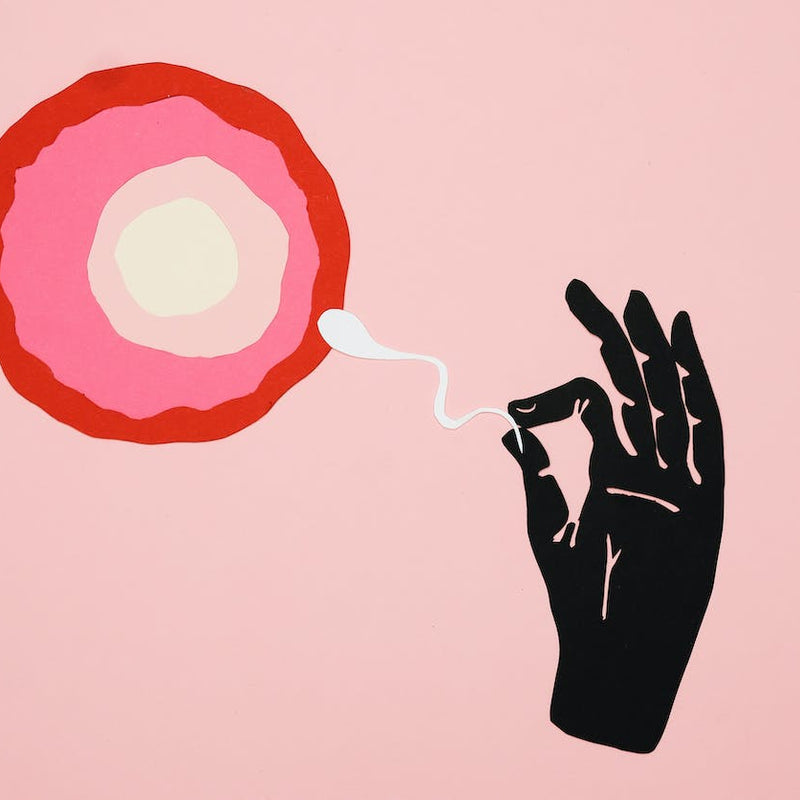What to Know About Using Fertility Lubricant to Get Pregnant

Originally published 01/24/2020. Updated for accuracy and relevancy on 11/08/2023.
Can you use lubricant when trying to get pregnant? Will it help or harm sperm? Dr. Gleaton breaks it down for us.
Trying to conceive (TTC) can be a trying process both mentally and physically. An issue that comes up frequently with couples that are TTC is vaginal dryness. In fact, a survey of 900 TTC couples showed that vaginal dryness was two times higher in these couples than in the general population. [1] The survey also revealed that sexual intimacy was negatively impacted because of this. [1]
Most couple’s natural response to this is to reach for some sort of lubricant. We know that a good portion of TTC couples (at least 25% according to this study) do in fact use lubricant of some sort. [1] But if you are TTC, it may be worth taking a closer look at what you use.
Fertility Lubricant for Trying to Get Pregnant
Now, if you’ve ever walked through your local drugstore or pharmacy, it’s hard to miss the variety of lubricants that are available for purchase. With so many options, it can be hard to know which are safe when TTC. How do you know which lubricants are not spermicidal (i.e., won’t harm or kill sperm)? How do you know which lubricants won’t hurt your chances of getting pregnant? Luckily, these questions are straightforward to answer.
While using the most basic lubricants won't necessarily prevent you from getting pregnant, they can certainly affect your chances of success.
We know from older research that sperm typically make it into the cervical canal within minutes. [2] This time frame is what can really be affected by what lubricant you use. In 2014, researchers looked at the percentage of sperm that were moving at specific time intervals after exposure to certain lubricants. They investigated nine lubricants, and none of them resulted in any changes in DNA integrity. [3]
Another study in that same year looked at sperm motility with different lubricants. [4] Commercial options were used, as were household items like baby oil, canola oil, and sesame oil. While one brand outperformed the other commercial lubricants, sperm still had a small drop in motility after 30 minutes. [4] The study concluded sesame oil and synthetic coital lubricants impaired sperm motility and may hamper fertility. [4]
While this research is nice and all, these studies tested just a few of the brands that are available on the market. Nowadays, there are even more options—especially ones geared toward those who are trying to get pregnant. And making sense of all the information on labels and the marketing for lubricants can create even more anxiety.
FDA-Cleared Fertility Lubricants
Enter the US Food and Drug Administration (FDA). Because the stakes for TTC couples are so high, the FDA has created a special category—the PEB category—for lubricants that are safe to use when trying to conceive. To be cleared by the FDA as a fertility-safe lubricant, the product must be tested extensively to make sure it’s safe for sperm, eggs, and embryos. Once on the market, the manufacturer is required to test each batch of product to verify that it does not harm sperm motility, survival, or integrity.
To be cleared by the FDA as a fertility-safe lubricant, the product must be tested extensively to make sure it’s safe for sperm, eggs, and embryos.
In addition, fertility lubricants are tested to make sure they have a similar pH and viscosity to semen and fertile cervical mucus so that they provide a protective environment for sperm and allow them to swim normally within the lubricant. This way, fertility lubricants supplement your natural lubrication rather than changing it. Finally, fertility lubricants are screened when they’re made and throughout their shelf life for toxins produced by bacteria that may harm sperm and eggs.
Moral of the story? The only sure way to know that your lubricant won’t harm sperm is to choose an FDA-cleared fertility lubricant, like Natalist’s fertility-friendly lubricant, The Lube.
Lubricant Do’s and Don’ts
Last but not least, here are some basic do’s and don’ts to help guide your general lubricant selection:
- Don’t buy lubricants with a pH above 7-8
- Don’t use lubricants containing small penetrating chemicals (e.g., glycerol) or parabens
- Do make sure that any lubricant labeled “non-spermicidal.” “Organic” or “natural” is actually FDA-cleared as a fertility lubricant—as explained above, only the FDA-cleared lubricants are required to undergo testing that proves the product won’t harm sperm or eggs
- Don’t use household oils, since household oils often contain toxic peroxides and inflammatory chemicals that develop over time due to exposure to light, room temperature, and the purity of the oil
Happy lubricating!
Read more about lubricants:
- Guide to Types of Lube: Water, Oil, & Silicone Based
- What Are Some Safe Alternatives to Lube?
- Lube and Vaginal Health
References:
- Ellington, J. & Short,. (2003). Prevalence of vaginal dryness in trying-to-conceive couples. Fertility and Sterility - FERT STERIL. 79. 21-22. 10.1016/S0015-0282(03)00127-4.
- SOBRERO AJ, MACLEOD J. The immediate postcoital test. Fertil Steril. 1962;13:184-189. doi:10.1016/s0015-0282(16)34447-8
- Mowat A, Newton C, Boothroyd C, Demmers K, Fleming S. The effects of vaginal lubricants on sperm function: an in vitro analysis. J Assist Reprod Genet. 2014;31(3):333-339. doi:10.1007/s10815-013-0168-x
- Sandhu RS, Wong TH, Kling CA, Chohan KR. In vitro effects of coital lubricants and synthetic and natural oils on sperm motility. Fertil Steril. 2014;101(4):941-944. doi:10.1016/j.fertnstert.2013.12.024
Reach Out, We're Here
Have questions about your order or products? For the speediest answer, check out our FAQ section. Need something else? Come find us below.
Please keep in mind our regular business hours; Monday-Friday, 9am-5pm CT.
Customer Support
support@natalist.com
Press Inquiries
media@everlyhealth.com
Business & Partnerships
team@natalist.com
Affiliates + Influencers
team@natalist.com
Job Openings
Careers Page
























